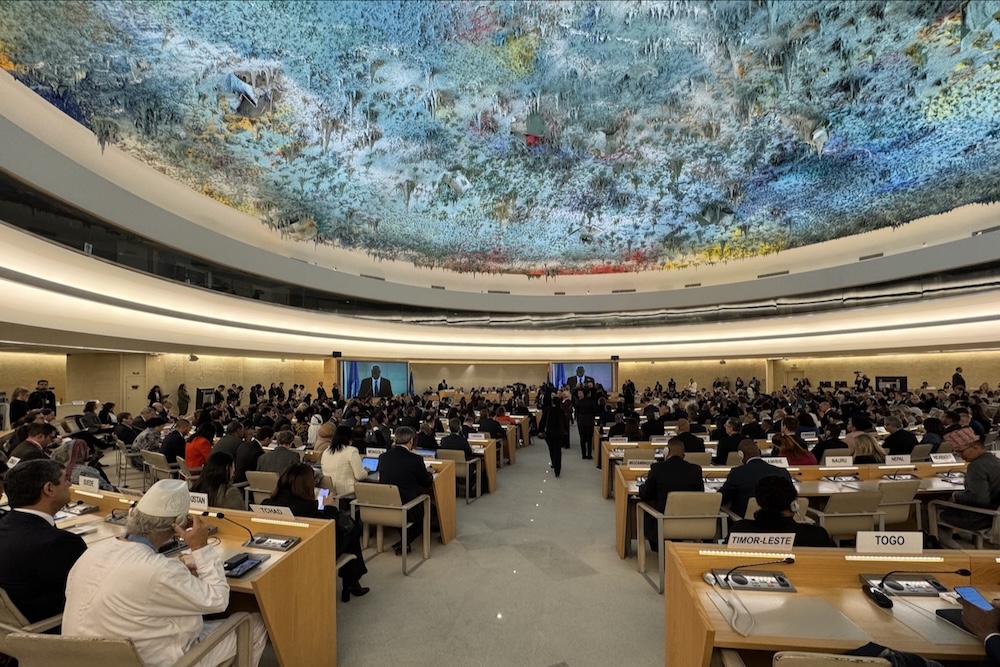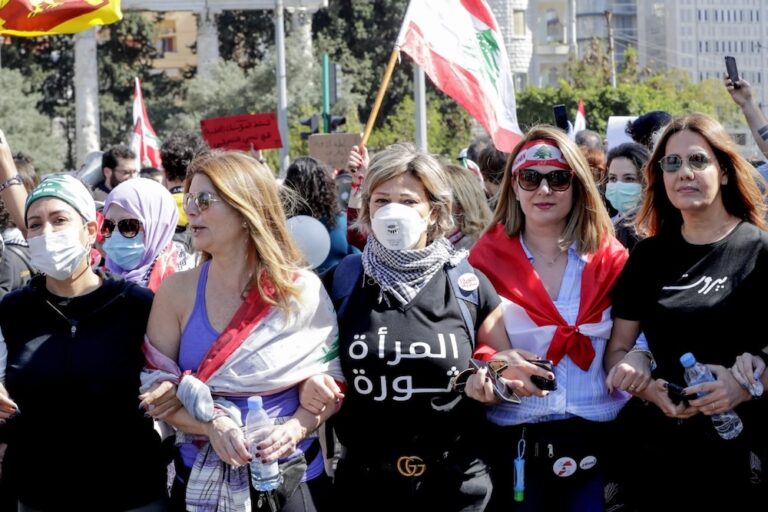CIHRS highlights key outcomes from the UNHRC session, including the renewal of Syria's inquiry and continued inaction on human rights violations in Gaza, Algeria, and Egypt.
This statement was originally published on cihrs.org on 15 April 2025.
On 4 April, the 58th session of the United Nations Human Rights Council (UNHRC) ended with the unanimous adoption of a resolution to renew the UN Independent Commission of Inquiry on Syria (COI). This represents a critical victory for rights groups who advocated against state efforts to severely weaken or eliminate the COI, the UN body tasked with investigating and pursuing accountability for war crimes and other rights violations committed in Syria.
In addition to renewing the COI, the resolution on Syria highlighted the importance of victims of violations and civil society participating in the transitional process, and the critical need to pursue accountability. Nevertheless, the adopted resolution failed to explicitly condemn the summary executions and sectarian massacres committed in Syria’s coastal region. Referring to these atrocities as “alleged crimes that appear to have occurred in retaliation” not only minimizes their gravity but also dangerously shifts blame onto victims. This dilution of language is a disservice to the survivors and undermines the strong findings of the Commission of Inquiry and OHCHR.
According to Jeremie Smith, Director of the Geneva Office of the Cairo Institute for Human Rights Studies (CIHRS), “The resolution forcefully backs international accountability for crimes committed by the Assad regime, but is weaker when it comes to crimes committed by other parties before and after the transitional authorities took control.”
Some states have contended that the UN COI on Syria is no longer required or that its mandate to investigate war crimes and crimes against humanity should be downgraded after the fall of Assad. This has led some diplomats and members of civil society to express fear that calls to eliminate the COI will grow in strength when the resolution on Syria comes up for a vote again at the Council in early 2026.
During resolution negotiations, leading Syrian and regional human rights organizations, including CIHRS, organized a series of events to highlight ongoing atrocities being committed in the country. The civil society organizers underscored that peace, security, and justice in Syria are contingent upon the preservation of the three relevant UN mechanisms – the COI, the International Independent Investigative Mechanism on Syria, and the Independent Institution on Missing Persons in Syria.
In a statement to the Council, CIHRS affirmed, “A peaceful, stable Syria is in everyone’s interest. Recent reports on the killing of members of minority groups and the illegal military intervention of Israel and other countries pose an immediate threat to achieving this goal. Now is not the time to abandon international accountability and efforts to protect civilians. Doing so will only encourage further atrocities, undermining efforts to ensure a peaceful transition.”
The Council also adopted resolutions addressing war crimes and crimes against humanity carried out against Palestinians in Gaza and the West Bank. The resolutions emphasized the Palestinian people’s right to life, dignity and self-determination, the formation of an effective accountability mechanism, and the need to end the illegal Israeli occupation. Despite overwhelming evidence by the UN COI on Palestine of systematic use of forcible transfer, starvation, and rape, several states chose to oppose or abstain on these resolutions. In a major blow to efforts to ensure accountability for genocidal acts in Gaza, the Palestinian delegation withdrew a proposal to set up a body to create legal case files on these crimes after the US threatened sanctions against any country who supported the proposal, according to reports. The resolution instead asks the UN General Assembly to consider setting up such a body at its next meeting. In a statement to the Council, CIHRS strongly supported the adoption of a resolution that recognizes the catastrophic scale of Israel’s violence and demands it be held to account under international law. The resistance of certain EU states to the resolution starkly underscores the growing double standards in the Council. Inaction in the face of genocide is not neutrality – it is complicity.
A resolution on human rights defenders and new technologies was also adopted during the session that addresses urgent civil society concerns, including the use of spyware and AI in rights violations. While CIHRS welcomed the adoption of the resolution, however, the removal of references to transnational repression is a missed opportunity. Around the world – including in the MENA region – repressive governments increasingly target diaspora voices and exiled activists through indirect or proxy means. States must address this widening threat by banning digital surveillance tools used to silence dissent and by upholding protections for defenders abroad.
While human rights defenders attained important victories this session, the refusal by UN member states to support accountability efforts in a consistent and principled manner in regards to Algeria, Bahrain, Egypt, Palestine and other country situations is emblematic of the double standards that continue to undermine the Council’s ability to protect victims in critical human rights situations throughout the world.
Although the Special Rapporteur on Human Rights Defenders reported on the deteriorating civic space and criminalization of peaceful protest following her mission to Algeria, the Council did not respond to the demands of Algerian jurists and human rights organizations (including CIHRS), during a side event in parallel with the session. These demands center upon taking measures to protect local civil society, addressing the widespread violations in the country, and putting an end to impunity.

Before the 58th session commenced, NGOs urged the United Kingdom to lead on efforts to ensure joint Council action to address the ongoing human rights crisis in Egypt and ensure pressure towards the release of Alaa Abdel Fattah, a prominent Egyptian pro-democracy activist who has been unjustly imprisoned for over five years. The Council failed to take action despite these calls. In his testimony before the Council, journalist Peter Greste, who was detained in Egypt years ago and is on strike in solidarity with Alaa and his mother, emphasized that Egypt’s judiciary “is designed to push in at one end anyone who the authorities deem to be a political threat, and spit out convicted prisoners at the other.” Other testimonies about the cost of failing to address the human rights crisis in Egypt were presented by a group of Egyptian human rights defenders and the families of detained politicians and activists in Egypt during a side event organized by the Justice Committee with a number of organizations participating, including CIHRS.
The resolution on human rights defenders and counter-terrorism also passed during this session, was attacked by several countries. Hostile amendments proposed by Russia were rejected during the vote. In a statement to the Council, CIHRS joined the Special Rapporteur in calling for abusive security laws to be repealed, and urged the Council to scrutinize the counter-terrorism narratives used by states to legitimize authoritarianism.



